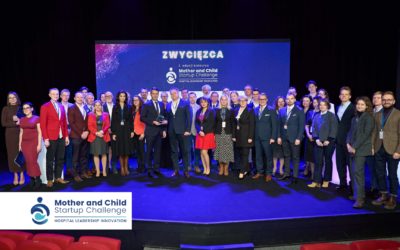So far in our Health Tech of the Week series, I have focused on showcasing innovative Polish startups operating in the medical industry. In the second edition, we are expanding our scope to include the investor’s perspective, which is extremely important for growing companies seeking external funding. Aleksander Kłósek from the YouNick Mint Venture Capital fund talks about what makes a startup stand out to secure financing.
What sets YouNick Mint apart from other funds?
Very often, fund managers come from consulting, strictly financial, or grant acquisition backgrounds. In our case, we are a team with rich entrepreneurial and business experience in various industries—development, pharmaceuticals, and IT. Moreover, we’ve been working together in the field of capital investments for over eight years, which allows us to understand our areas of expertise and allocate our time appropriately to different projects. Each new venture that comes to us is evaluated primarily in terms of its value proposition for customers, its business model, and how well it fits into market realities. Simply put, we think about how the solution addresses existing market problems, who will want to use it, and under what circumstances they’ll be willing to pay for it. We look for solutions that have an advantage embedded in the product/technology, rather than focusing on ventures where the key element of success depends on operational efficiency/execution (such as marketplaces). One of the few Polish VC funds, we are particularly interested in MedTech and BioTech projects. In addition to the business risks typical of other sectors, these require addressing challenges in the clinical and regulatory areas. Specialized knowledge is often necessary, taking into account nuances and dependencies that must be adapted to in the business development strategy. In the BioTech and Pharma segments, it’s also important to understand that the product development cycle is not only complex and costly but also very long (requiring a lot of investor patience! 🙂 However, this patience often pays off—our experiences and successes, especially exits from SmartPharma, PozLab, and Heart Sense, show that investor returns can be very favorable. Our understanding of the sector and solid grounding in this area certainly distinguishes us within the local ecosystem.
What are the main criteria when evaluating medical startups as potential investment targets?
I don’t think what I’ll say will be particularly surprising, but it’s a point so important that it’s worth emphasizing—the team is key. Some investors still place the main emphasis on technology, but at YouNick, we are increasingly inclined to seek the most motivated, experienced, and complementary team in terms of skills. The development of medical technologies is associated with many challenges, not only business or technological but also regulatory, which requires an understanding of the healthcare system, the needs of patients, clinicians, and all market participants. A competent team that can navigate the complexities of many fields is always a good indicator of a company’s success. The second criterion is, of course, the technology or other core innovation that carries potential market advantage. This is especially important for young organizations—startups that cannot compete on price or scale with established market leaders with vast human and financial resources. If we find an attractive niche and possess unique technology, especially one that we can protect with patents or know-how, we have a chance to build a competitive business or product that will quickly gain market traction or appear on the radar of large corporations’ M&A departments.

And the third criterion?
The third criterion is unmet market needs. In the case of medical technologies, we are almost always dealing with a multi-billion-dollar market (globally), where there is constant demand for innovative solutions. Even relatively niche markets (such as rare diseases) are attractive because the cost of therapy is high, especially for „first in class” or „best in class” products. The biggest challenge is immense international competition. Finding a niche substantial enough for the project to build sufficient value and get on the radar of large MedTech or BioTech companies is key to achieving a successful exit for founders and investors. It’s important to remember that what may be a profitable business for the founders may not always meet the expected return on investment for funds.
Does only a large, structurally mature startup stand a chance of obtaining funding?
A fund invests in ventures that have the potential to achieve returns commensurate with the level of risk taken. The fund’s profile determines at which stage it is ready to engage capital. Through the Bridge Alpha by YouNick Mint vehicle, we invested smaller amounts (up to one million PLN) in projects at very early stages of development, sometimes at the concept or initial prototype phase. Often, the team was just forming around the venture based on promising research results or an interesting idea. Investments at such an early stage are often aimed not so much at building a business in the traditional sense but at validating research or product hypotheses within the framework of a Proof of Concept. The assumption should be that among these projects, some will turn out to be „dead ends” and will be closed sooner or later. However, among them, there will be real gems, which after being „polished through subsequent investments,” will develop into full-fledged and profitable businesses. There are more and more such examples in Poland. Through Open Innovation by YouNick Mint (a fund implemented as part of the PFR Ventures program), we invested at later stages of development—in companies that were already generating revenue or had advanced product development. The VC market is open to ventures at various stages of development.

Does the founders’ experience in medical practice matter to you from an investment perspective?
Some teams are stronger technologically, while others were created by practicing physicians and therefore have stronger medical competencies. We neither prefer nor discriminate against any particular team. We want to understand the project’s context well and be convinced that the team operates effectively. Among our portfolio companies, we have individuals who had strictly entrepreneurial backgrounds in other industries. An example is Prosoma, which develops digital therapies supporting the mental health of oncology patients. The founder did not come from the medical world but built a great team that combines the necessary competencies and thoroughly understands the specifics of the field they operate in. On the other end of the spectrum was Heart Sense—a company developing unique solutions to assist surgeons during „bypass implantation” procedures. The innovator is an active cardiac surgeon who identified, based on his own practice in the operating room, the gaps that needed to be addressed to make procedures more effective and safe. Business knowledge and competencies came with time, in the course of executing the project. The risk of failure certainly increases when the founder or group of founders has a narrow (often very specialized) skill set and simultaneously wants to be the „sail, rudder, and ship.” It’s necessary to first acquire external knowledge and then build the right team. The days of Leonardo da Vinci are long gone—it’s impossible to be the „alpha and omega” in everything. Especially in MedTech and BioTech, which diverge from the stereotypical startup vision where all that’s needed for a great venture is a good idea and tech expertise. Here, a team of people who can „deliver” across all areas is needed, as well as a team that is open to and active in change.
YouNick Mint is an investment team managed by business practitioners from Healthcare (pharmaceuticals, medical devices, innovative materials, and medical products) and Industry 4.0 (especially material technologies, ICT, RPA, PropTech), who have been working together for years. Since 2012, the fund has invested in early-stage innovative projects and supports them with the expertise of its specialists. Over this period, YouNick has invested in nearly 50 companies through four funds, completing several exits. One of its recent investments is the Krakow-based biotech company nCage Therapeutics, which is working on next-generation vaccines. Other investments include Prosoma, bioinformatics company Intelliseq, and Lublin-based NK Tech, which supports patients after amputations by offering innovative prosthetic sockets.
Join us for the second part of the interview with Aleksander Kłósek from YouNick Mint VC, which will be published on the blog next week. In it, we’ll cover more on what sets Polish startups apart from the international competition and how regulatory risks influence investors’ decisions.
—
Stay tuned for more in the “Health Tech of the Week” series, where we’ll continue to uncover fascinating stories from the world of medical technologies that are changing the face of healthcare. If you’re working on an innovative project in the field of new technologies and medicine or want to recommend an interesting solution, contact us at: [email protected].
Why do we focus on balance? How mental health is gaining value
In the "Health Tech of The Week" initiative, I discuss health comprehensively, emphasizing the importance of a holistic approach to individuals....
Cognitive Behavioral Therapy from Home Instead of the Office
They’ve moved therapists and patients in front of a computer screen, increasing access to therapy and mental health support—without losing its...
Technology Guarding the Lives of Newborns: Polish Startup Wins the Mother and Child Startup Challenge 2024
On November 27, 2024, Warsaw's Capitol Theatre hosted the grand finale of the third edition of the Mother and Child Startup Challenge—one of the...




